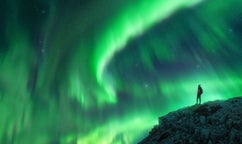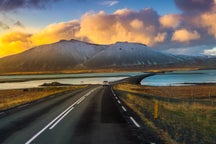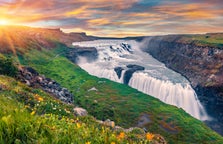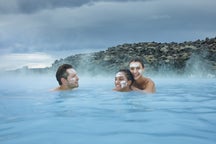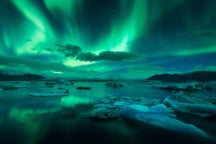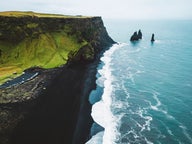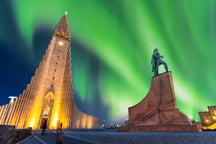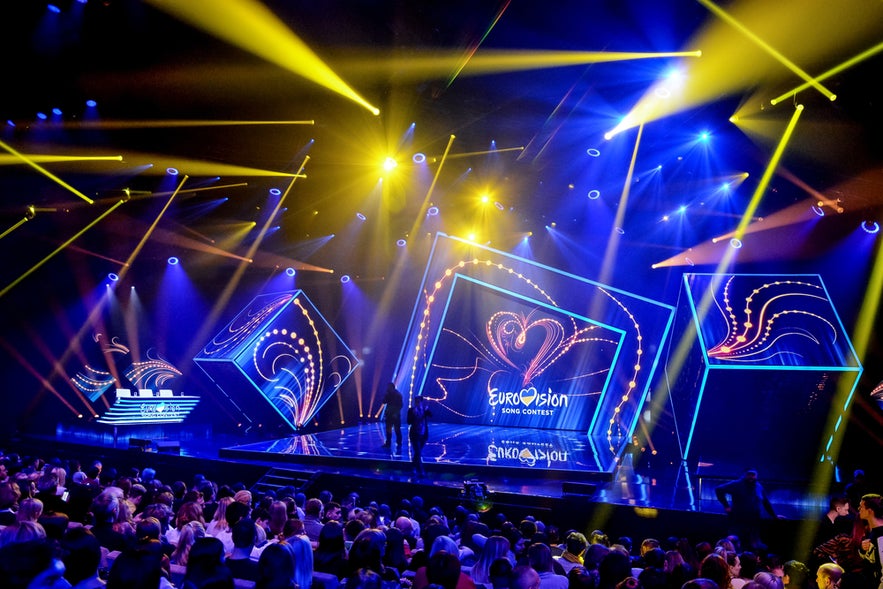
Iceland in Eurovision has consistently exceeded expectations for a country of its size, delivering memorable performances and strong results since debuting in 1986. With its confirmed withdrawal from Eurovision 2026, revisit Iceland’s Eurovision journey, covering past results, standout performances, and the story behind the 2026 hiatus.
Iceland has an incredibly rich music scene and is famously passionate about the Eurovision Song Contest, but has never won. In Iceland, Eurovision is a national obsession, with a history full of second-place highs, elimination heartbreaks, and a whole lot of sequins.
Why You Can Trust Our Content
Guide to Iceland is the most trusted travel platform in Iceland, helping millions of visitors each year. All our content is written and reviewed by local experts who are deeply familiar with Iceland. You can count on us for accurate, up-to-date, and trustworthy travel advice.
2026 marks a rare pause on the Eurovision stage, as Iceland has confirmed it will not participate. Here, we take a year-by-year look at each entry, highlighting standout performances, key results, and the story behind Iceland’s 2026 withdrawal.
What You Should Know About Iceland in Eurovision
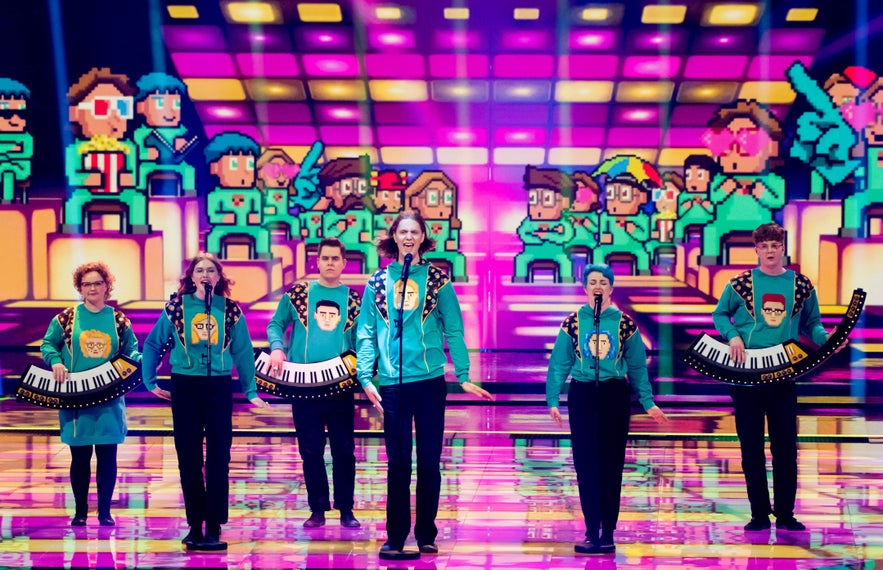 Here are some fun and interesting facts about Iceland in Eurovision:
Here are some fun and interesting facts about Iceland in Eurovision:
-
Iceland joined Eurovision in 1986 and has competed almost every year since, quickly becoming one of the contest’s most enthusiastic participants.
-
The country selects its entries through Söngvakeppnin, a televised national competition that draws nationwide attention and sparks lively debates among fans.
-
Iceland has participated 37 times but has never won the contest.
-
The country’s best results were second place, achieved in 1999 with Selma’s “All Out of Luck” and in 2009 with Yohanna’s “Is It True?”.
-
Iceland finished in last place four times: in 1989, 2001, 2018, and 2024.
-
In 2019, Iceland’s broadcaster RÚV was fined €5,000 by the European Broadcasting Union after its Eurovision entry Hatari displayed Palestinian flags on live television, violating the contest’s rule against political statements.
-
Daði og Gagnamagnið’s 2020 song “Think About Things” became an international viral sensation, even though the contest was canceled due to COVID-19.
-
Many entries have been performed entirely in Icelandic, highlighting the country’s commitment to cultural pride and linguistic tradition.
-
The Netflix film “Eurovision Song Contest: The Story of Fire Saga” turned the town of Husavik into a fan pilgrimage site, attracting visitors from around the world.
Iceland’s Eurovision story is full of passion, creativity, and surprises, and it continues to evolve with the latest 2026 developments.
Iceland Withdraws from Eurovision 2026
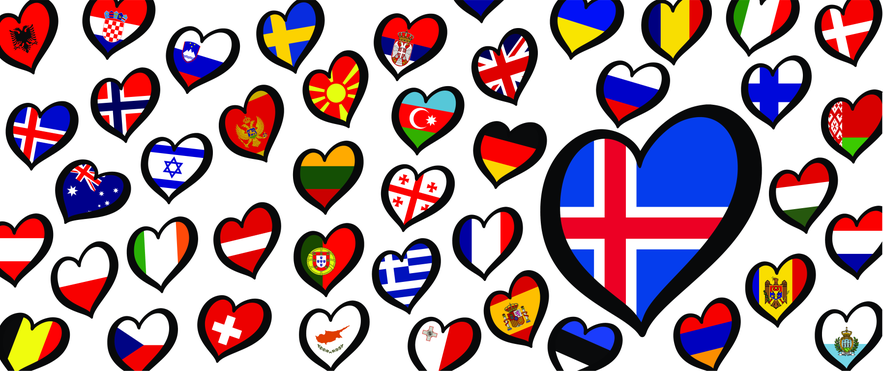
RÚV cited the continued inclusion of Israel in the contest as the primary reason for the decision, making the withdrawal a form of protest. As a result, Söngvakeppnin will not take place in 2026, leaving fans without their usual pre-contest festivities and televised national competition.
Iceland’s decision comes amid wider criticism of Eurovision’s claim of being apolitical. While Russia was banned from the contest in 2022 following its invasion of Ukraine, similar calls to exclude Israel have grown in recent years due to the ongoing genocide in Gaza. Several other countries, including Spain, Ireland, Slovenia, and the Netherlands, have also chosen to boycott Eurovision in 2026.
While the decision has disappointed some hardcore Eurovision enthusiasts, it underscores Iceland’s willingness to take a stand on important issues, even within the highly apolitical world of the contest.
Iceland's Eurovision Entries (2020 - 2024)
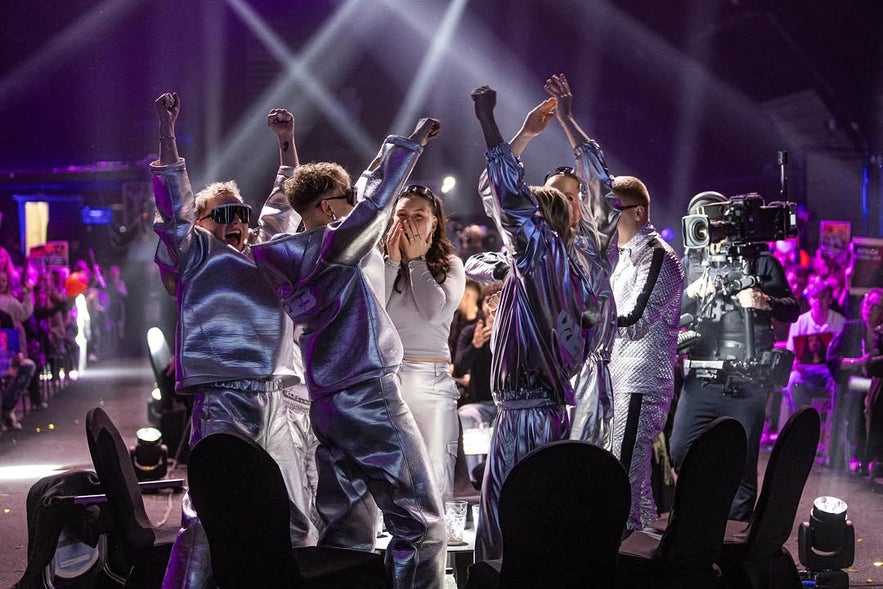 Image Credit: Songvakeppnin (Instagram @songvakeppnin)
Image Credit: Songvakeppnin (Instagram @songvakeppnin)
Between 2020 and 2024, Iceland delivered some of its most memorable Eurovision entries. From viral internet sensations to emotional performances, the country balanced innovation with tradition. These years showcased Iceland's evolving music scene, with acts that stood out for their authenticity, stagecraft, and a flair that kept fans paying attention.
2025 – VÆB – “Róa”
For Eurovision 2025, Iceland was represented by VÆB. The pop duo won Söngvakeppnin with “Róa,” a high-energy track drawing from Nordic pop and folk influences. They topped both the jury and public votes, securing a confident victory in a competitive final without needing a superfinal round.
Unlike some recent entries, VÆB performed entirely in Icelandic on the Eurovision stage. Finishing 25th in the Grand Final, the duo ended Iceland’s two-year non-qualification streak (2023–2024) with a performance praised for its authentic Nordic pop style and precise choreography.
2024 – Hera Björk – “Scared of Heights”
Veteran performer Hera Björk returned with "Scared of Heights," a powerful ballad reflecting personal growth and overcoming fears. Despite her commanding vocals, the song did not advance past the semi-finals. However, it added depth to Iceland's Eurovision narrative.
2023 – Diljá – “Power”
Diljá's "Power" was a dynamic anthem of self-empowerment, showcasing her vocal strength and stage presence. Despite a spirited performance, the song narrowly missed the final, finishing 11th in the semi-finals.
2022 – Systur – “Með hækkandi sól”
Systur's "Með hækkandi sól" brought a serene folk harmony to the stage, celebrating familial bonds and natural beauty. Their soothing performance qualified for the final, where they finished 23rd.
2021 – Daði og Gagnamagnið – “10 Years”
Returning after their viral success, Daði og Gagnamagnið delivered "10 Years," a funky tribute to enduring love. Despite a COVID-19 setback preventing a live performance, their rehearsal footage captivated audiences, securing a 4th-place finish and reaffirming Iceland's innovative presence in Eurovision.
2020 – Daði og Gagnamagnið – “Think About Things”
"Think About Things" by Daði og Gagnamagnið became a viral sensation with its quirky choreography and catchy melody. Though the 2020 contest was canceled due to the COVID-19 pandemic, the song's popularity soared online, solidifying its place as a fan favorite and showcasing Iceland's innovative spirit. Many Icelanders and other Eurovision fans strongly believe that the song would have won that year's competition had it taken place.
Honorary Mention - Eurovision Song Contest: The Story of Fire Saga
Released in 2020, this Netflix comedy brought Iceland to Eurovision fame through a fictional duo chasing their dream amid chaos, lava, and elves.
The film follows Lars and Sigrit, an eccentric Icelandic duo from Husavik, unexpectedly chosen to represent Iceland at Eurovision. Their journey blends heart, humor, and Icelandic oddities, ending in an unforgettable performance that wins Europe's hearts.
“Husavik (My Hometown)” became the emotional centerpiece of the film. Performed by Molly Sandén (as Rachel McAdams' singing voice), the ballad showcases Iceland's charm and identity. It earned an Oscar nomination and turned the real town of Husavik into a Eurovision pilgrimage site.
At the real 2021 Eurovision competition, several references were made to the film. Notably, Iceland’s jury spokesperson was Hannes Óli Ágústsson, who appeared in character as Ólaf Yohansson from the movie, referencing another song from the film, Jaja Ding Dong.
Husavik: The Eurovision Town in Iceland
Husavik rose to global fame right after the movie was released. With its charming harbor, whale-watching tours, and newfound Eurovision pride, this small coastal town in northern Iceland has become a must-visit destination for fans and curious travelers.
Here are some suggested tours and vacation packages if you're planning to visit Husavik:
-
Husavik Walking Tour with Eurovision Highlights: Explore filming locations from the Eurovision movie on a guided walk through Husavik. End with an optional visit to the Eurovision Museum for behind-the-scenes stories and fun photo ops.
-
The Original Husavik Whale Watching Tour: Experience the magic of whale watching in Iceland’s whale capital, where humpbacks and minkes frequently surface just offshore.
-
The Geosea Geothermal Baths in Husavik Admission Ticket: Relax in oceanside geothermal pools with panoramic views of Skjalfandi Bay and snow-capped mountains beyond.
-
Private 3 Day Tour of North Iceland with Dettifoss, Myvatn, Husavik & Akureyri: See North Iceland’s top natural wonders with a private guide and a flexible itinerary.
-
6-Day Guided Ring Road Tour in Summer: Circle the country on this summer tour packed with waterfalls, volcanoes, glaciers, and a stop in Husavik.
-
Guided 10 Day Photography Tour of the Complete Ring Road: Ideal for shutterbugs, this in-depth tour captures Iceland's dramatic beauty-from waterfalls and lava fields to black sand beaches.
Iceland Eurovision Entries 2010-2019
This decade is marked by Iceland's bold evolution on the Eurovision stage, blending emotional ballads with daring pop and quirky performances. Between 2010 and 2019, the country consistently pushed creative boundaries while staying true to its musical roots, earning respect and growing a loyal international fanbase.
2019 – Hatari – “Hatrith mun sigra”
Hatari's "Hatrith mun sigra" was a bold fusion of industrial techno and political commentary. Their provocative performance and striking visuals challenged Eurovision norms, earning a 10th-place finish.
The 2019 contest, held in Israel, was already controversial, and Hatari drew further attention by displaying the Palestinian flag during the final voting, a protest against the ongoing conflict that sparked widespread debate about the role of politics in Eurovision.
2018 – Ari Olafsson – “Our Choice”
Ari Olafsson's "Our Choice" was a heartfelt ballad promoting unity and love. His sincere performance and the song's classic orchestration aimed to inspire, but it did not advance to the final, reflecting the diverse musical tastes of the Eurovision audience.
2017 – Svala – “Paper”
Svala's "Paper" was a sleek electro-pop entry that showcased her powerful vocals and contemporary style. The minimalist staging and emotive delivery aimed to connect with viewers, but the song did not progress to the final, highlighting the fierce competition that year.
2016 – Greta Salome – “Hear Them Calling”
Returning to the Eurovision stage, Greta Salome's "Hear Them Calling" featured a dramatic performance with striking visuals. The song's blend of folk and pop elements, combined with Greta's dynamic presence, captivated audiences, though it narrowly missed qualifying for the final.
2015 – Maria Olafs – “Unbroken”
Maria Olafs' "Unbroken" was a hopeful anthem about resilience and self-discovery. Despite its uplifting message and María's charming performance, the song did not advance to the final.
2014 – Pollaponk – “No Prejudice”
With vibrant colors and an anti-discrimination message, Pollaponk's "No Prejudice" brought fun and social commentary to the stage. The band's energetic performance and catchy tune led to a 15th-place finish and a memorable moment in Eurovision history.
2013 – Eythor Ingi – “Eg a Lif”
Eythor Ingi's "Eg a lif" was a soulful ballad sung entirely in Icelandic. His emotive performance and the song's heartfelt lyrics earned a 17th-place finish, reinforcing Iceland's commitment to authentic expression on the Eurovision stage.
2012 – Greta Salome & Jonsi – “Never Forget”
"Never Forget" combined haunting melodies with dramatic staging, as Greta Salome & Jonsi delivered a powerful duet. The song's emotional depth and striking visuals captivated viewers, earning Iceland a spot in the final and showcasing the nation's flair for storytelling.
2011 – Sjonni’s Friends – “Coming Home”
A heartfelt tribute, "Coming Home" was performed by Sjonni's Friends in honor of the late Sigurjón Brink. The song's warm melody and touching backstory helped secure a 20th-place finish and left a lasting impression of unity and remembrance.
2010 – Hera Bjork – “Je Ne Sais Quoi”
Hera Bjork's "Je Ne Sais Quoi" was a high-energy dance track that showcased her impressive vocal range. The song qualified for the final and finished 19th, adding another memorable performance to Iceland's Eurovision history. It's become a local favorite to play at any Eurovision party!
Iceland Eurovision Entries 2000-2009
At the start of the millennium, Iceland brought bold ambition and variety to the Eurovision stage. Entries ranged from catchy pop anthems to heartfelt ballads, each aiming to capture Europe’s attention. While results varied, the era cemented Iceland’s role as a creative Eurovision contender.
2009 – Yohanna – “Is It True?”
Yohanna's "Is It True?" was a poignant ballad that captivated audiences with its emotional delivery. The song achieved a remarkable 2nd-place finish, equaling Iceland's best result and solidifying its status as a Eurovision favorite.
2008 – Euroband – “This Is My Life”
Euroband's "This Is My Life" was an upbeat dance track that energized the Eurovision stage. The duo's dynamic performance earned them a spot in the final, where they finished 14th, marking a successful return to the finals for Iceland.
2007 – Eirikur Hauksson – “Valentine Lost”
Eirikur Hauksson's "Valentine Lost" was a rock ballad that highlighted his powerful vocals. Despite a strong performance, the song didn't make it to the final, illustrating the challenges artists face in standing out in a diverse lineup.
2006 – Silvia Night – “Congratulations”
Silvia Night's "Congratulations" was a satirical performance that stirred controversy and divided opinions. While it didn't advance to the final, the act remains one of the most talked-about entries in Eurovision history, showcasing Iceland's bold approach to the contest.
2005 – Selma – “If I Had Your Love”
Returning to the Eurovision stage, Selma's "If I Had Your Love" was a vibrant pop track filled with energy. Despite high expectations, the song didn't qualify for the final.
2004 – Jonsi – “Heaven”
Jonsi's "Heaven" was a heartfelt ballad that showcased his vocal prowess. Despite a passionate performance, the song placed 19th. Nevertheless, "Heaven" remains a cherished entry in Iceland's Eurovision repertoire.
2003 – Birgitta – “Open Your Heart”
Birgitta's "Open Your Heart" was a powerful pop anthem that captivated audiences with its emotional depth and strong vocals. The song secured an impressive 8th-place finish, reaffirming Iceland's ability to deliver memorable performances on the Eurovision stage.
2001 – Two Tricky – “Angel”
Two Tricky's "Angel" aimed to charm with its heartfelt lyrics and melody. Unfortunately, the performance didn't resonate with the audience, resulting in a 22nd-place finish with just 3 points. Despite the outcome, the song remains a part of Iceland's diverse Eurovision journey.
2000 – August & Telma – “Tell Me!”
August & Telma brought charm and sparkle to the stage with “Tell Me!” Their cheerful duet and easy chemistry gave the contest a shot of youthful energy. The song placed 12th but became a fan favorite, keeping Iceland’s pop momentum alive into the new millennium.
Iceland Eurovision Entries 1986-1999
Iceland made its Eurovision debut in 1986, stepping onto the stage with high hopes and a fresh voice. Entries during 1986 to 1999 leaned into classic ballads, dramatic performances, and early pop experimentation. These foundational years shaped Iceland's identity in the contest and built loyal fan support.
1999 – Selma – “All Out of Luck”
After sitting out in 1998, Iceland returned swinging. Selma’s “All Out of Luck” was a slick pop hit that brought electricity back to the stage. With energetic choreography and vocals to match, she landed Iceland its first-ever second-place finish, setting a new standard for the country. It's an all-time favorite among locals as well.
1997 – Paul Oscar – “Minn hinsti dans”
Paul Oscar broke boundaries with "Minn hinsti dans," delivering a bold performance that challenged Eurovision norms. His avant-garde staging and introspective lyrics earned a 20th-place finish but left a lasting impression. This song has a cult following among fans, marking a pivotal moment in Iceland's Eurovision narrative.
1996 – Anna Mjoll – “Sjubidu”
Anna Mjoll's "Sjubidu" was a jazzy tribute to musical legends, blending Icelandic charm with international flair. Her spirited performance earned a 13th-place finish, showcasing Iceland's versatility and appreciation for diverse musical styles.
1995 – Bo Halldorsson – “Nuna”
Bo Halldorsson's "Nuna" was a tender ballad urging listeners to cherish the present moment. His sincere delivery resonated with audiences, securing a 15th-place finish and adding another heartfelt performance to Iceland's Eurovision legacy.
1994 – Sigga – “Naetur”
Sigga's "Naetur" painted a dreamy landscape with its poetic lyrics and serene melody. Her heartfelt performance earned Iceland a respectable 12th place, reinforcing the nation's reputation for delivering emotionally resonant entries that linger in the hearts of Eurovision fans.
1993 – Inga – “Tha veistu svarid”
Inga's "Tha veistu svarid" is a poignant ballad that captivated audiences with its sincerity. Finishing 13th, the song is remembered for its emotional resonance and Inga's compelling delivery, further cementing Iceland's reputation for heartfelt Eurovision entries.
1992 – Heart 2 Heart – “Nei eða já”
Heart 2 Heart's "Nei eda ja" brought a refreshing energy to the Eurovision stage. The catchy tune and dynamic performance earned Iceland a 7th-place finish, marking one of the country's better results and showcasing its flair for engaging pop music.
1991 – Stefan & Eyfi – “Draumur um Nínu”
Stefan & Eyfi's "Draumur um Nínu" is a heartfelt ballad about longing and unrequited love. Despite its 15th-place finish, the song remains a beloved classic in Iceland, often sung at gatherings and cherished for its emotional depth and memorable melody. You'll be hard pressed to find an Icelander that can't belt out the lyrics during Karaoke night!
1990 – Stjornin – “Eitt lag enn”
Stjornin's upbeat duet, "Eitt lag enn," brought Iceland its first top-five finish, landing in 4th place. The song's infectious rhythm and charming performance captivated audiences, marking a high point and showcasing Iceland's growing prowess in the Eurovision arena.
1989 – Daniel Agust Haraldsson – “Það sem enginn sér”
Daniel Agust introspective ballad, "Thad sem enginn ser," sought to captivate with its poetic depth. However, it failed to resonate, finishing last with zero points. Despite the setback, the song is remembered for its heartfelt delivery.
1988 – Beathoven – “Thu og their (Sokrates)”
Beathoven's quirky homage to cultural icons, "Thu og their (Sokrates)," opened the 1988 contest with flair. Despite its energetic performance, the song secured 16th place. Its playful lyrics and catchy tune remain a memorable part of Iceland's Eurovision journey.
1987 – Halla Margret – “Hagt og hljott”
Halla Margret's "Hagt og hljott" marked Iceland's second appearance at Eurovision. The ballad, translating to "Slowly and Quietly," showcased her emotive vocals and the nation's penchant for heartfelt performances. Despite finishing 16th, it solidified Iceland's commitment to making a mark on the Eurovision stage.
Iceland in Eurovision’s Debut: ICY in 1986
Iceland stepped onto the Eurovision stage in 1986 with the trio ICY and their upbeat song “Gledibankinn,” which translates to “Bank of Joy.” The performance was colorful, cheerful, and earnest, but the European audience gave it only 16th place.
It wasn’t the breakthrough Iceland may have hoped for, but it marked the beginning of a long-standing tradition.
FAQs About Iceland's Eurovision History
Here’s a quick guide to some of the most searched-for facts about Iceland’s Eurovision journey.
Has Iceland ever won Eurovision?
No. Iceland has never won, though it finished in second place twice: in 1999 with Selma’s “All Out of Luck” and in 2009 with Yohanna’s “Is It True?”.
When did Iceland first compete in Eurovision?
Iceland made its Eurovision debut in 1986 with the group ICY and their song "Gleðibankinn."
Has Iceland ever missed Eurovision?
Yes. Iceland did not participate in 1998 and 2002 due to the contest’s former relegation system. In addition, Iceland will not compete in 2026, marking a rare voluntary withdrawal.
What are some of Iceland’s most iconic Eurovision performances?
Iceland has delivered memorable performances that are remembered for musical quality and stage presence, including Selma’s “All Out of Luck” (1999), Yohanna’s “Is It True?” (2009), and Daði og Gagnamagnið’s “Think About Things” (2020), which went viral worldwide.
Has Iceland ever been involved in a controversial performance?
Yes. The 2019 entry by Hatari, “Hatrid mun sigra,” combined industrial techno with political protest, including waving Palestinian flags on live television, which resulted in a 5,000 EUR fine for Iceland’s broadcaster RÚV.
Iceland’s Best Musical Talents and Eurovision Legacy
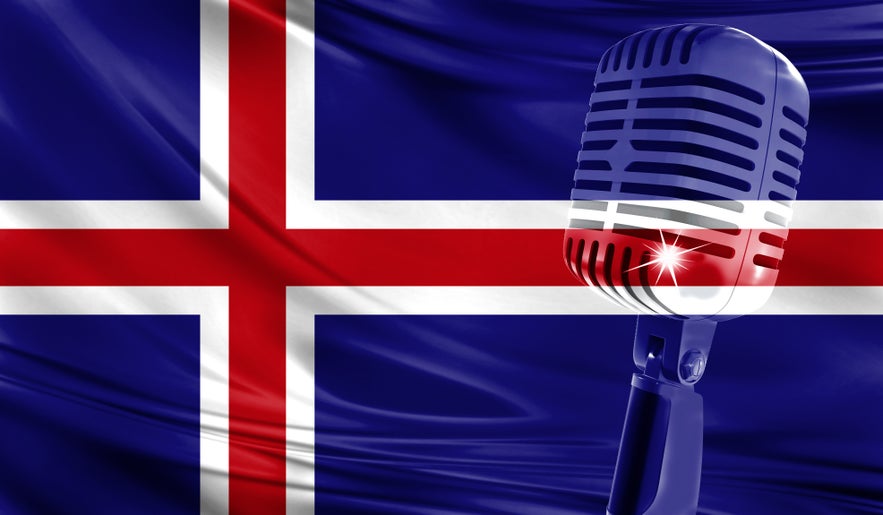 Over nearly four decades, Iceland has delivered unforgettable performances, bold experimentation, and cultural pride on the Eurovision stage. Although it will not compete in 2026, Iceland’s Eurovision legacy remains vibrant, inspiring fans both at home and abroad.
Over nearly four decades, Iceland has delivered unforgettable performances, bold experimentation, and cultural pride on the Eurovision stage. Although it will not compete in 2026, Iceland’s Eurovision legacy remains vibrant, inspiring fans both at home and abroad.
Eurovision has showcased some of Iceland’s best musical talents, from veterans like Selma and Hera Björk to modern acts such as Daði og Gagnamagnið. Beyond the contest, these artists are part of a thriving Icelandic music scene that continues to produce innovative and internationally admired performers.
Which of Iceland’s Eurovision performances is your favorite? Were there any that deserved to win? Share your thoughts in the comments below!







